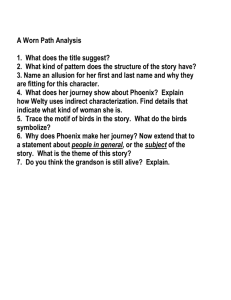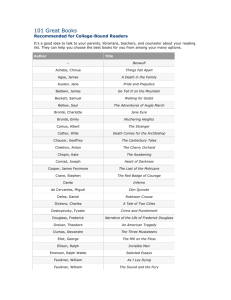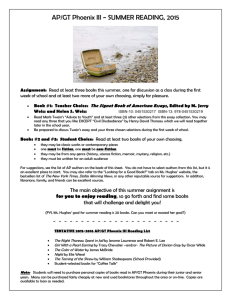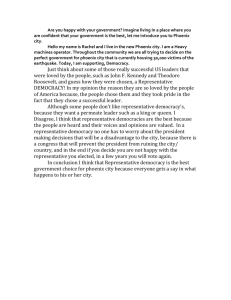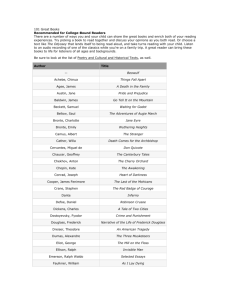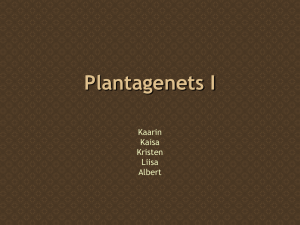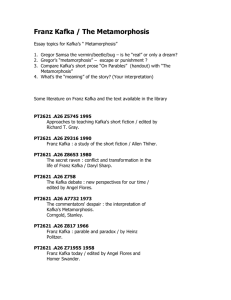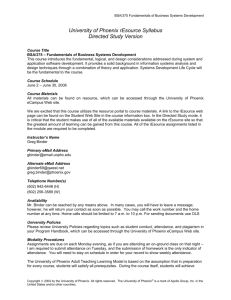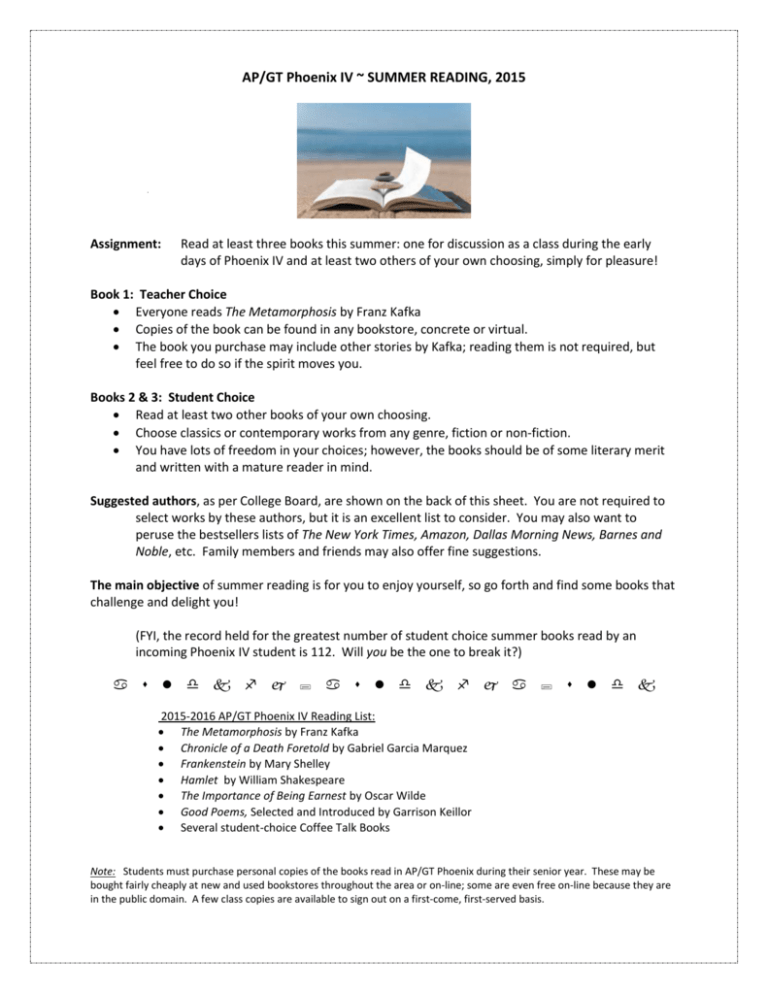
AP/GT Phoenix IV ~ SUMMER READING, 2015
Assignment:
Read at least three books this summer: one for discussion as a class during the early
days of Phoenix IV and at least two others of your own choosing, simply for pleasure!
Book 1: Teacher Choice
Everyone reads The Metamorphosis by Franz Kafka
Copies of the book can be found in any bookstore, concrete or virtual.
The book you purchase may include other stories by Kafka; reading them is not required, but
feel free to do so if the spirit moves you.
Books 2 & 3: Student Choice
Read at least two other books of your own choosing.
Choose classics or contemporary works from any genre, fiction or non-fiction.
You have lots of freedom in your choices; however, the books should be of some literary merit
and written with a mature reader in mind.
Suggested authors, as per College Board, are shown on the back of this sheet. You are not required to
select works by these authors, but it is an excellent list to consider. You may also want to
peruse the bestsellers lists of The New York Times, Amazon, Dallas Morning News, Barnes and
Noble, etc. Family members and friends may also offer fine suggestions.
The main objective of summer reading is for you to enjoy yourself, so go forth and find some books that
challenge and delight you!
(FYI, the record held for the greatest number of student choice summer books read by an
incoming Phoenix IV student is 112. Will you be the one to break it?)
2015-2016 AP/GT Phoenix IV Reading List:
The Metamorphosis by Franz Kafka
Chronicle of a Death Foretold by Gabriel Garcia Marquez
Frankenstein by Mary Shelley
Hamlet by William Shakespeare
The Importance of Being Earnest by Oscar Wilde
Good Poems, Selected and Introduced by Garrison Keillor
Several student-choice Coffee Talk Books
Note: Students must purchase personal copies of the books read in AP/GT Phoenix during their senior year. These may be
bought fairly cheaply at new and used bookstores throughout the area or on-line; some are even free on-line because they are
in the public domain. A few class copies are available to sign out on a first-come, first-served basis.
Representative Authors for AP Literature as per College Board:
There is no recommended or required reading list for the AP English Literature and Composition course.
The following authors are provided simply to suggest the range and quality of reading expected
in the course. Teachers may select authors from the names below or may choose others
of comparable quality and complexity.
Poetry
W. H. Auden; Elizabeth Bishop; William Blake; Anne Bradstreet; Edward Kamau Brathwaite; Gwendolyn Brooks;
Robert Browning; George Gordon, Lord Byron; Lorna Dee Cervantes; Geoffrey Chaucer; Lucille Clifton; Samuel
Taylor Coleridge; Billy Collins; H. D. (Hilda Doolittle); Emily Dickinson; John Donne; Rita Dove; Paul Laurence
Dunbar; T. S. Eliot; Robert Frost; Joy Harjo; Seamus Heaney; George Herbert; Garrett Hongo; Gerard Manley
Hopkins; Langston Hughes; Ben Jonson; John Keats; Philip Larkin; Robert Lowell; Andrew Marvell; John Milton;
Marianne Moore; Sylvia Plath; Edgar Allan Poe; Alexander Pope; Adrienne Rich; Anne Sexton; William Shakespeare;
Percy Bysshe Shelley; Leslie Marmon Silko; Cathy Song; Wallace Stevens; Alfred, Lord Tennyson; Derek Walcott;
Walt Whitman; Richard Wilbur; William Carlos Williams; William Wordsworth; William Butler Yeats
Drama
Aeschylus; Edward Albee; Amiri Baraka; Samuel Beckett; Anton Chekhov; Caryl Churchill; William Congreve; Athol
Fugard; Lorraine Hansberry; Lillian Hellman; David Henry Hwang; Henrik Ibsen; Ben Jonson; David Mamet; Arthur
Miller; Molière; Marsha Norman; Sean O’Casey; Eugene O’Neill; Suzan-Lori Parks; Harold Pinter; Luigi Pirandello;
William Shakespeare; George Bernard Shaw; Sam Shepard; Sophocles; Tom Stoppard; Luis Valdez; Oscar Wilde;
Tennessee Williams; August Wilson
Fiction (Novel and Short Story)
Chinua Achebe; Sherman Alexie; Isabel Allende; Rudolfo Anaya; Margaret Atwood; Jane Austen; James Baldwin;
Saul Bellow; Charlotte Brontë; Emily Brontë; Raymond Carver; Willa Cather; Sandra Cisneros; John Cheever; Kate
Chopin; Joseph Conrad; Edwidge Danticat; Daniel Defoe; Anita Desai; Charles Dickens; Fyodor Dostoevsky; George
Eliot; Ralph Ellison; Louise Erdrich; William Faulkner; Henry Fielding; F. Scott Fitzgerald; E. M. Forster; Thomas
Hardy; Nathaniel Hawthorne; Ernest Hemingway; Zora Neale Hurston; Kazuo Ishiguro; Henry James; Ha Jin; Edward
P. Jones; James Joyce; Maxine Hong Kingston; Joy Kogawa; Jhumpa Lahiri; Margaret Laurence; D. H. Lawrence;
Chang-rae Lee; Bernard Malamud; Gabriel García Márquez; Cormac McCarthy; Ian McEwan; Herman Melville; Toni
Morrison; Bharati Mukherjee; Vladimir Nabokov; Flannery O’Connor; Orhan Pamuk; Katherine Anne Porter;
Marilynne Robinson; Jonathan Swift; Mark Twain; John Updike; Alice Walker; Evelyn Waugh; Eudora Welty; Edith
Wharton; John Edgar Wideman; Virginia Woolf; Richard Wright
Expository Prose
Joseph Addison; Gloria Anzaldúa; Matthew Arnold; James Baldwin; James Boswell;Jesús Colón; Joan Didion;
Frederick Douglass; W. E. B. Du Bois; Ralph Waldo Emerson; William Hazlitt; bell hooks; Samuel Johnson; Charles
Lamb; Thomas Macaulay; Mary McCarthy; John Stuart Mill; George Orwell; Michael Pollan; Richard Rodriguez;
Edward Said; Lewis Thomas; Henry David Thoreau; E. B. White; Virginia Woolf
Source: © 2008 The College Board. All rights reserved.
Visit the College Board on the web: www.collegeboard.com.
Phoenix IV
The Metamorphosis
Close Reading: Snippet
Due: on or before the third day of class
Grade: 5 point Add-in
The purpose of a snippet
is to show your understanding of a piece of literature
by finding a line in the work
that encompasses the meaning of the work as a whole.
There are four (4) parts:
1. Write out the proper MLA citation for your copy of The Metamorphosis as it would
appear on a Works Cited page.
2. Pick the most important, significant, or meaningful sentence in the novella. (Note: You
may NOT use the first line of the book.) Write it down, word-for-word, properly
punctuated and parenthetically documented. Choose a line that is thematically
significant, not something that is important merely in terms of plot. Excavate for
meaning. Show that you understand there’s more at play here than the plot device of a
man becoming a bug.
3. Briefly but clearly explain what is going on in the story at the time the quote appears.
(This is the part when…)
4. Commentary: FYI, this is the most important part of the snippet and should be where
you expend most of your effort. In a substantial, well-written paragraph, thoroughly
explain the significance of the quote. Your commentary should reflect your
understanding of the thematic content of the text.
Details: Typed; double-spaced; easy-to-read font; proper MLA heading

